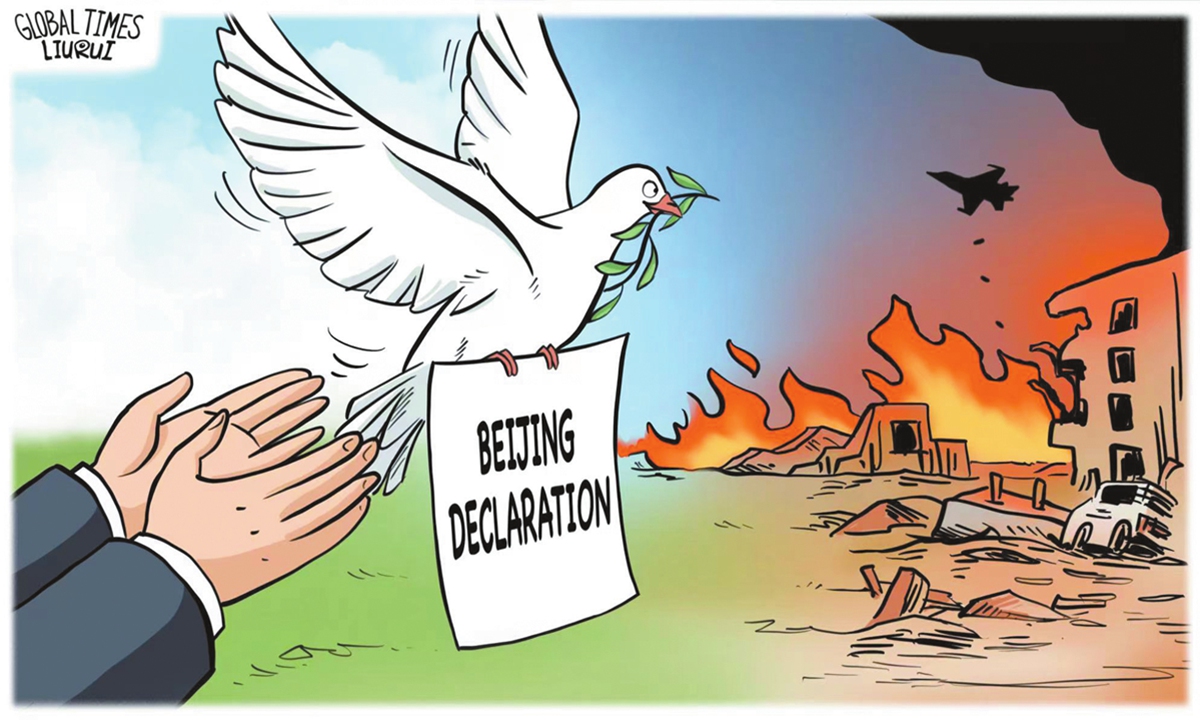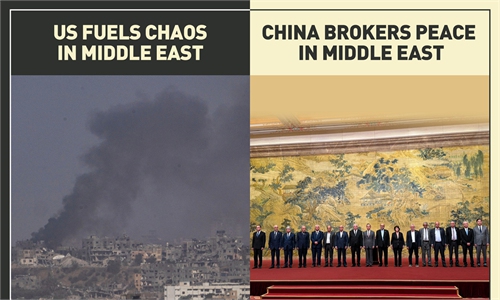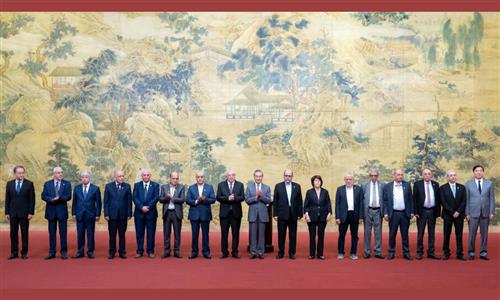
Illustration: Liu Rui/GT
Fatah and Hamas, along with other Palestinian factions, signed on Tuesday the Beijing Declaration on ending division and strengthening Palestinian national unity, sending a shock wave across the world. This is the second agreement regarding the Middle East signed under China's mediation, following the deal between Iran and Saudi Arabia to restore full-fledged diplomatic ties last year. Palestinian internal unity has long been a difficult issue, so why did 14 Palestinian factions travel all the way to Beijing to discuss it? Will they uphold the declaration, and what will its regional significance be?
After the death of former Fatah leader Yasser Arafat in 2004, internal divisions in Palestine began to deepen. Afterwards, efforts to reunite continued to emerge, with many external interventions. However, the mutual weaknesses of external and internal factors have prevented any substantial progress in Palestinian national unity.
First, the power to facilitate reconciliation between the two sides is limited. The US considers Hamas a terrorist group and only backs Mahmoud Abbas' Palestinian Authority, making it impossible to promote Palestinian unity. Historically, Arab countries have been the main supporters of the Palestinian Liberation Organization (PLO), but internal divisions in the Arab world have led to Arab countries reaching separate reconciliations with Israel and seeking peace. International powers, such as the US, offer financial aid to Abbas' Palestinian Authority on the condition that they adopt a moderate approach, renounce violence and work toward peace with Israel.
In 2011, Fatah and Hamas held negotiations in Egypt and signed a reconciliation agreement; in 2022, under the mediation of Algeria, the two parties signed an agreement in Algiers. However, these agreements are very fragile and have not been implemented.
China, however, has gained strong capabilities and widespread trust and has actually become the most stable and sincere external force in promoting unity among various factions in Palestine.
Second, the current situation is different from the past. In the past, Fatah and Hamas each had their own territory and ways of survival. After the serious conflict between Hamas and Israel on October 7 last year, Israel not only vowed to eradicate Hamas, but also intended to occupy the Gaza Strip for a long time after the war, threatening the survival of the entire PLO movement. If Hamas completely loses control of Gaza, it will have nowhere to turn, and Fatah's influence will also be greatly diminished.
The entire Palestinian nation, including Hamas and Fatah, is urgent need of unity at this critical juncture. Hence, leaders of 14 Palestinian factions, including Hamas and Fatah, went to Beijing together.
Third, China is the most qualified to talk about national unity with abundant historical experience and practical resources in this issue. China is a permanent member of the UN Security Council and the largest force outside the Western world. China has the greatest credibility in guiding the Palestinian factions to reach an agreement and pushing them to abide by the agreement.
China has a clear long-term goal, that is, promoting lasting peace in the Middle East and the establishment of a Palestinian state based on United Nations resolutions. In other words, China's goals of promoting Palestinian national unity and lasting peace in the Middle East are highly unified and have greater continuity. Moreover, China's long-term goal is supported by Russia, Europe and most countries in the world. The Palestinian factions following China's proposal is equally moving toward unity, lasting peace and the establishment of a Palestinian state recognized by all countries in the world and the United Nations. That's why the agreement on national unity was reached in Beijing on Tuesday and was made public to the world in the form of the Beijing Declaration.
Although the future will remain complicated, with Israel expressing dissatisfaction with the Palestinian factions' goal of forming an interim national reconciliation government and realizing effective management of Gaza, the overall response from the international community has been positive. UN Secretary-General Antonio Guterres welcomed the signing of the Beijing Declaration by Palestinian factions and stressed that this is "an important step" toward furthering Palestinian unity.
EU Special Representative for the Middle East Peace Process Sven Koopmans congratulated and appreciated China's successful mediation of 14 Palestinian factions to hold reconciliation talks in China and sign the Beijing Declaration. He emphasized that this is a remarkable achievement, and said that the EU looks forward to further strengthening communication and coordination with China to jointly pushing for a cease-fire and ending the conflict in Gaza. Malaysian Prime Minister Anwar Ibrahim posted on social media that the Beijing Declaration aimed at strengthening Palestinian unity is "so crucial for realizing the rights of the Palestinian people."
This is a milestone in Palestine's journey toward new national unity and another milestone in China's Global Security Initiative to promote world peace.
The author is a Chinese media professional. opinion@globaltimes.com.cn




